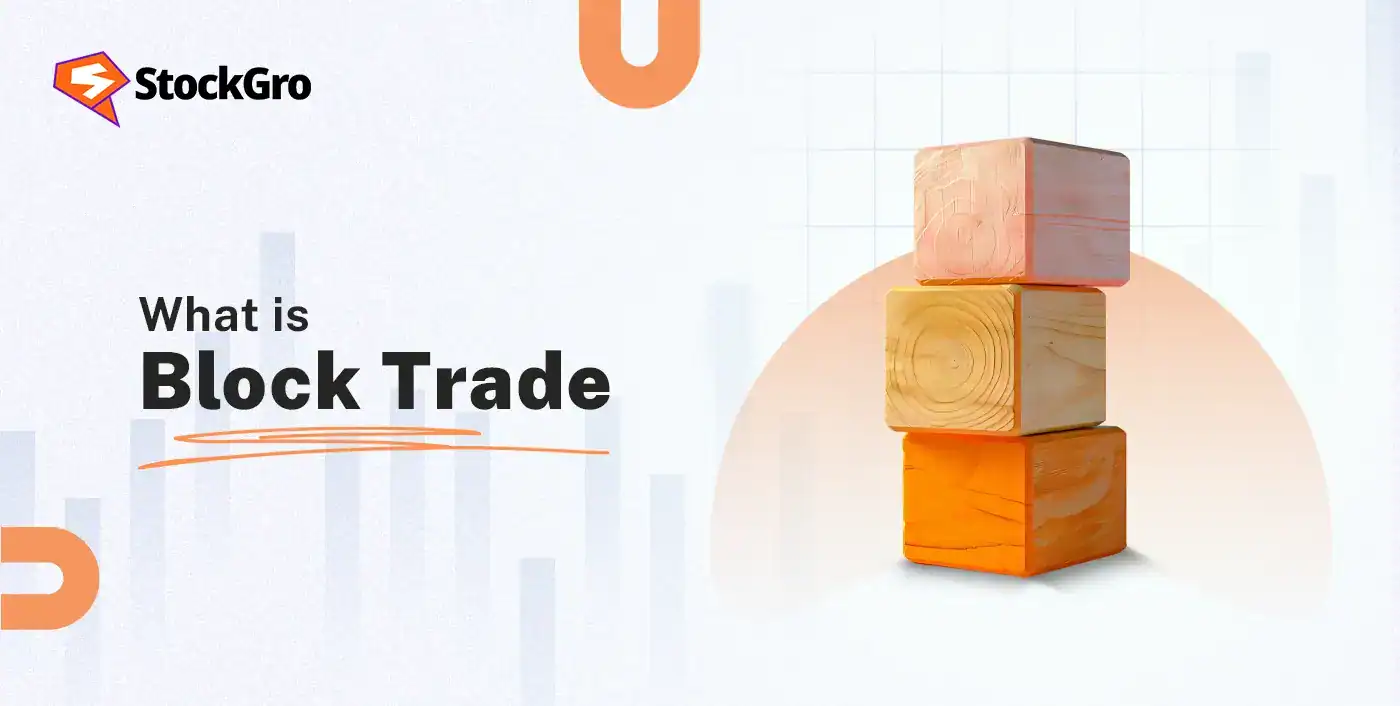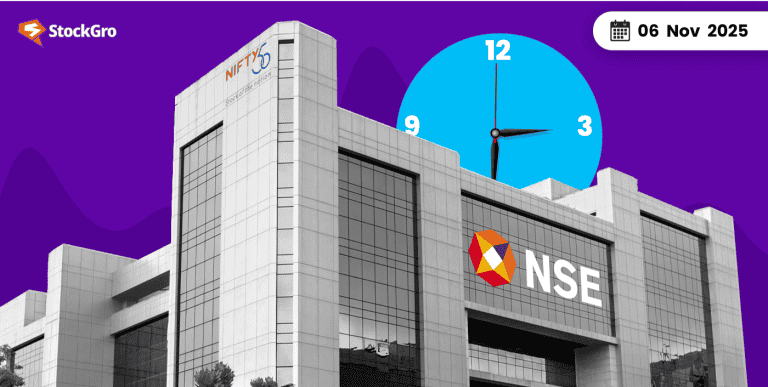
A large-scale trade, involving thousands of crores, can shake market prices and trigger volatility, but that’s where block trades come in.
Block trade allows bulk transactions to be executed in a single go, away from the regular market, by which massive buying or selling doesn’t distort the stock’s price, ensuring stability while big investors quietly shift their positions.
Read further to understand what block trade is and how it works to prevent distortion in regular market movement.
What is Block Trade?
A block trade is a large, privately negotiated transaction for a large number of securities that is executed outside of the regular, public stock market to avoid influencing the prices.
These trades are usually conducted by institutional investors like mutual funds and hedge funds, and the price for these trades is agreed beforehand between the buyer and seller.
For instance, shares of Kotak Mahindra Bank were recently in focus when Japan’s Sumitomo Mitsui Banking Corporation (SMBC) offloaded its entire 1.65% stake (on Sep 11,2025), worth about ₹6,256 crore, through block deals that attracted global and domestic investors.
Key Features of Block Trades
- Large-scale Trade: The block trades involve a large number of shares or a high market value, and a minimum order size of ₹25 Cr is required.
- Institutional Investors & Private Negotiation: The block trades are privately negotiated by institutional investors like mutual funds and hedge funds, away from the public exchange to prevent market impact.
- Minimised Market Impact: The execution of these large trades off the public screen helps in avoiding drastic price fluctuations or slippage.
- Confidentiality & Use of intermediaries: The trades are facilitated by brokers, and the details of the trade are kept private until the transaction is executed, to prevent market speculation based on the information.
How Block Trades Work in the Stock Market
- Identification of need: An institutional investor, such as a mutual fund, identifies its needs to buy or sell a large block of securities and then contacts a specialised broker or investment bank.
- Counterparty search: The broker finds a suitable counterparty for the trade, either another institutional investor or a dealer willing to take the other side of the transaction.
- Private negotiation & Execution: The buyer and seller privately negotiate the terms of the trade, mainly the price, away from the public market, and execute the trade through the intermediary.
- Post-trade reporting: The completed trade is then reported to the stock exchange, which is a regulatory requirement to ensure transparency in the market.
Rules About Block Deal Trading
Block deal trading refers to the purchase or sale of a large quantity of shares (typically 5 lakh shares or ₹5 crore worth) between two institutional investors or large entities in a single transaction. Block deals are generally executed outside of the regular market session at pre-determined prices to minimize the impact of large trades on the market.
- Regulated by Exchanges: Block deals are executed on the exchange platform, and the buyers and sellers need to inform the exchange beforehand.
- Pre-approval Requirement: Transactions must be pre-approved and reported to the exchange, ensuring transparency and compliance.
- Price Range: The price at which the block deal is executed must fall within a specified price range, ensuring that it is not excessively above or below the market price.
Reporting Requirements
- Timely Reporting: Block deals need to be reported to the exchange within 15 minutes of execution. This ensures transparency and allows other market participants to be aware of large trades.
- Details to Report: The details of the block deal, such as the number of shares traded, the price, and the identity of the buyer and seller (if publicly disclosed), must be submitted to the exchange.
- Confirmation of Execution: Both buyers and sellers are required to confirm the transaction with the exchange to prevent disputes and ensure the deal was carried out as agreed.
Price Range
- Price Band: The price at which block deals can be executed is restricted within a set price band, which is typically defined as a certain percentage above or below the market price of the stock on the day of the deal.
- Premium or Discount: The price of the block deal may either be at a premium or discount to the prevailing market price, depending on the agreement between the buyer and seller, but it cannot be far outside the set price range.
Timing Settlement Process
- Settlement Period: The settlement process for block deals generally follows the same schedule as regular trades, typically T+2 (i.e., the transaction is settled two days after the deal).
- Clearing and Settlement: Clearing corporations handle the settlement of block deals to ensure that the shares are transferred to the buyer and the payment is received from the seller.
- No Impact on Market Liquidity: Since block deals are often executed off-market (outside the regular trading session), they don’t usually impact the liquidity of the stock during regular trading hours.
How to Do Block Trading
Block trading is a method used for buying or selling a large quantity of securities in a single transaction. It is typically done by institutional investors or large traders to avoid affecting the market with their large trades. Here’s how block trading generally works:
- Pre-arranged Agreement: A block trade is usually pre-arranged between the buyer and seller, often with the assistance of brokers or exchanges.
- Price Determination: The price at which the transaction takes place is negotiated and agreed upon by both parties, ensuring that it falls within the price range prescribed by the exchange.
- Reporting: The trade must be reported to the exchange after the transaction, typically within 15 minutes of execution.
Dark Pools
Dark pools are private exchanges or forums for trading securities that are not visible to the public. They allow institutional investors to make large trades without revealing their intentions to the wider market, which helps in reducing price slippage. Dark pools provide anonymity and are generally used for block trading of large orders.
- Liquidity: Dark pools offer deep liquidity, enabling large orders to be executed without moving the market price significantly.
- Privacy: The identity of buyers and sellers is kept confidential, ensuring that market participants don’t react to the trades.
Iceberg Orders
Iceberg orders are large orders that are broken into smaller, more manageable chunks to prevent the market from moving too much in response. Only a small portion of the order is visible at any given time, with the rest of the order hidden until the visible portion is filled.
- Purpose: The goal is to minimize market impact by only showing part of the order to the market while the rest is executed quietly in the background.
- Usage: This type of order is often used in block trading to prevent large price movements due to big trades.
Direct Negotiation
Direct negotiation in block trading involves the buyer and seller negotiating the terms of the trade directly, without going through the public market. It’s typically facilitated by brokers or institutions that can match large buyers and sellers.
- Flexible Pricing: The parties involved can agree on a price, which may differ from the market price, based on the size of the trade and current market conditions.
- Efficiency: Direct negotiations can make the process more efficient, especially when the transaction volume is high and public order books might not accommodate such large trades.
What is Block Trading in Future Trading?
In futures trading, block trading refers to the execution of large buy or sell orders for futures contracts, which are typically negotiated privately. Block trades in futures allow traders or institutions to avoid disrupting the market by executing large transactions outside the regular trading hours or through a private agreement.
- Private Execution: Similar to equity block trading, futures block trades are arranged and then reported to the exchange after execution.
- Settlement: The settlement process for block trades in futures follows the same procedures as regular futures trades.
Block Trade vs Cross Trade
- Block Trade: A block trade is a large transaction executed either on or off the exchange. The transaction is reported after execution, and the price is typically agreed upon between the buyer and seller.
- Cross Trade: A cross trade occurs when a broker buys and sells the same security for different clients, at the same price, within a short time. Unlike block trades, cross trades are typically executed within the same brokerage firm and do not involve a third party.
- Key Difference: Block trades involve large-scale transactions, while cross trades are mainly conducted for the benefit of different clients within the same broker or institution.
Normal Trade vs Block Trade vs Bulk Deal?
| Aspect | Normal Trade | Block Trade | Bulk Deal |
| Transaction Size | Small or typical market orders | Large quantity orders, typically ₹5 crore or more | Typically involves 10,000 shares or ₹10 lakh+ |
| Market Impact | High impact on price due to the volume | Minimal market impact as trades are pre-arranged | May impact market price but less than normal trades |
| Visibility | Public order books | Private or hidden until execution and reporting | Publicly visible during market hours |
| Who Uses It? | Individual traders and small investors | Institutional investors, large traders | Institutional investors, high-volume traders |
What Are the SEBI Rules with Exact Limits?
SEBI (Securities and Exchange Board of India) regulates block trades and bulk deals in India to ensure transparency and fairness in the market. The rules include:
- Block Deals: The minimum transaction size for a block deal is ₹5 crore, or 5 lakh shares, whichever is higher.
- Bulk Deals: A bulk deal involves 0.5% or more of the company’s shares in a single transaction. The deal must be reported to the exchange within 15 minutes of execution.
- Price Range: Both block and bulk deals are subject to certain price limits, which are generally set as a percentage above or below the current market price.
Difference between Block Trades and Regular Trades
| Aspects | Block Trades | Regular Trades |
| Volume | It involves significantly large quantities of stocks, minimum ₹25 Cr. | It deals in smaller quantities, determined by individual investors and are not subject to a minimum volume threshold. |
| Execution | These are privately negotiated and executed between parties, through brokers or investment banks, in a trading window to avoid disrupting the open market. | It is executed directly on the public exchange during regular market hours. |
| Participants | It involves institutional investors like mutual funds, pension funds, hedge funds, and high-net-worth individuals. | It involves a wide range of investors, including retail investors. |
| Market Impact | It has minimised market impact due to private negotiation and off-exchange execution. | It can cause price fluctuations because they occur on the open market. |
| Transparency | It is less transparent to the general public because they are negotiated privately | It is more transparent as the trades are visible on the exchange’s order book. |
| Purpose | It is done to manage large portfolios, meet large withdrawal demands, or make strategic changes without affecting the stock price. | It is done to buy or sell securities as needed by individual investors. |
Benefits of Block Trades
- Minimised Market Impact: It provides the ability to buy or sell a large volume of securities to institutional investors without causing significant price fluctuations in the public market, and prevents price slippage.
- Execution Certainty & Efficiency: The terms such as price, volume, and timing are privately negotiated and agreed upon in advance, which offer greater certainty of the trade’s execution.
- Liquidity Provision: The block trades provide liquidity when large investors need to move a large position but cannot find enough buyers or sellers at the market price in the public market.
- Better Terms & Pricing: The direct negotiation process leads to more favorable pricing or terms than what might be available on a public exchange, especially for illiquid securities.
Risks and Considerations
- Counterparty & Liquidity Challenges: For a block trade, finding a counterparty for an extremely large trade can be challenging, especially for less liquid stocks or during volatile market conditions.
- Less Transparency: The block trades occur outside the public order book, which can reduce real-time transparency and impact the price for other market participants, like retail investors.
- Regulatory Scrutiny and Compliance: The block trades are subject to specific regulations and reporting requirements, which require full compliance to avoid legal issues and penalties.
- Broker-Dealer Risk: The intermediaries involved in the trade take on risk by committing to a price before finding an offsetting buyer or seller, which makes them subject to losses from market movements.
Regulatory Guidelines for Block Trades in India
This framework, implemented by SEBI, regulates block trades in the Indian stock market:
- Block Deal Window: Block trades can be executed in two sessions, the morning block deal window from 8:45–9:00 AM and the afternoon window from 2:05–2:20 PM.
- Price Band: The orders shall be placed within ±3% of the applicable reference price set for each window to maintain price stability.
- Minimum Trade Size: The block deal must be valued at a minimum of ₹25 crore, to ensure it’s limited to large institutional trades.
- Transparency: After market hours, the exchanges must publish trade details like stock name, client, quantity, and traded price for transparency.
- Surveillance: The stock exchanges, clearing corporations, and depositories must implement regular trading, settlement, and risk control standards for block deal windows.
How to Identify Block Trades on the Stock Exchange
- Track Block Trades window: The exchanges have specified times, designed to accommodate large transactions, for block trades, that is, the morning and afternoon windows in India, which are not available to retail investors.
- Look for Large volume: A block trade is a single transaction that exceeds a certain size threshold. Therefore, a sudden increase in traded quantity in a single transaction, ₹25 crore or more, during block deal windows signals a block trade.
- Market Reports and News Feeds: The brokers are required to report block deals to the exchange after they have been executed. So, keeping track of the market and news helps to identify such transactions early and understand their impact on stock prices and investor sentiment.
- Specialised software and alerts: Investors can use software to receive real-time alerts when block trades occur for specific stocks or asset classes. This software can help in spotting large institutional activity that may not be immediately visible on standard order books.
Conclusion
Block trades are for large investors to execute big transactions efficiently without disrupting the market prices. It is regulated by SEBI, which promotes stability, transparency, and liquidity in India’s stock market.
While offering advantages like minimal market impact and better pricing, block trades also demand strict compliance and careful negotiation between institutional participants. Understanding their structure helps investors interpret market movements with more clarity.
FAQ‘s
Block trades are large, privately negotiated transactions between institutional investors, which are executed outside the regular market to avoid sudden price movements and ensure stability.
Block trades are usually considered good, as they enable large investors to trade efficiently without causing volatility. However, multiple block deals in the same stock can sometimes indicate significant portfolio shifts.
Block trades are privately negotiated, large-volume deals executed in special trading windows with minimal market impact, unlike regular trades visible on the open exchange.
Investors can view block trades data on NSE and BSE websites under the Market Data → Block Deals section, published after the market hours.
Institutional investors such as mutual funds, hedge funds, pension funds, and high-net-worth individuals who meet SEBI’s minimum ₹25 crore threshold usually participate in the block trades.
Block trades allow large trades without disrupting prices, ensure execution certainty, provide liquidity, and offer better pricing through direct negotiation.
While individual block trades don’t usually impact stock prices, however, repeated large transactions or those involving major investors can influence market perception and sentiment.
After the block trades are executed, the brokers report the trade to the stock exchange, with the details, such as stock name, volume, and price, to disclose publicly after the trading hours.
Yes, block trades are legal and fully regulated by SEBI in India, which defines trade size, timing, price limits, and disclosure rules to maintain fairness in the stock market.
Yes, block trading is legal in India. It is regulated by stock exchanges like the NSE (National Stock Exchange) and BSE (Bombay Stock Exchange). As per the rules, block trades must be reported to the exchange within 15 minutes of execution to ensure transparency and prevent market manipulation.
A block trade can be both good and bad, depending on the perspective and context.
Good: Block trades allow institutional investors to buy or sell large quantities of securities without causing significant market impact, thus avoiding price manipulation or volatility.
Bad: If done improperly or with the intention of manipulating the market, block trades can lead to unfair price changes and lack of liquidity for smaller investors.
A block trade is a large transaction in the stock market where a large number of securities (usually worth ₹5 crore or more) are bought or sold by institutional investors. These transactions are typically pre-arranged between the buyer and the seller and executed either on or off the exchange.
Block trading is generally safe if conducted following regulatory guidelines. It ensures large trades don’t impact the market price too drastically. However, like any large-scale transaction, if done without proper oversight, it can lead to market distortions. For retail investors, transparency and fair execution by brokers are key factors in ensuring safety.

